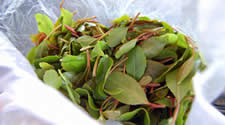 Somalia on Sept. 13 agreed to lift its recently imposed ban on imports of the mildly psychoactive leaf khat after an outcry of protest from angry cultivators in neighboring Kenya. The decision was announced at a summit of East African leaders in the Somali capital, Mogadishu—the first such gathering in 40 years in the war-torn region. While it is widely chewed in Somalia, khat (also called miraa) is grown in Kenya and Ethiopia, where large farming communities rely on exports for their livelihoods. Reversal of the ban is apparently effective immediately. Kenya's foreign minister Amina Mohamed said at the summit, "The leaders have discussed relations between the two countries and...the Miraa ban will be lifted by September 14th."
Somalia on Sept. 13 agreed to lift its recently imposed ban on imports of the mildly psychoactive leaf khat after an outcry of protest from angry cultivators in neighboring Kenya. The decision was announced at a summit of East African leaders in the Somali capital, Mogadishu—the first such gathering in 40 years in the war-torn region. While it is widely chewed in Somalia, khat (also called miraa) is grown in Kenya and Ethiopia, where large farming communities rely on exports for their livelihoods. Reversal of the ban is apparently effective immediately. Kenya's foreign minister Amina Mohamed said at the summit, "The leaders have discussed relations between the two countries and...the Miraa ban will be lifted by September 14th."


 The
The  2014 witnessed considerable fraying of the international Drug War consensus—but the horrific violence that finally sparked this long-overdue reckoning continued to take its grim toll. On the upside, Uruguay regsitered its
2014 witnessed considerable fraying of the international Drug War consensus—but the horrific violence that finally sparked this long-overdue reckoning continued to take its grim toll. On the upside, Uruguay regsitered its  The United Kingdom's ban on possession, sale and importing of khat took effect at the end of June, officially making the midly stimulating leaf a restricted
The United Kingdom's ban on possession, sale and importing of khat took effect at the end of June, officially making the midly stimulating leaf a restricted 






Recent comments
17 hours 6 sec ago
20 hours 47 min ago
1 week 2 days ago
3 weeks 2 days ago
4 weeks 4 days ago
4 weeks 5 days ago
5 weeks 2 days ago
13 weeks 2 days ago
14 weeks 1 day ago
15 weeks 2 days ago